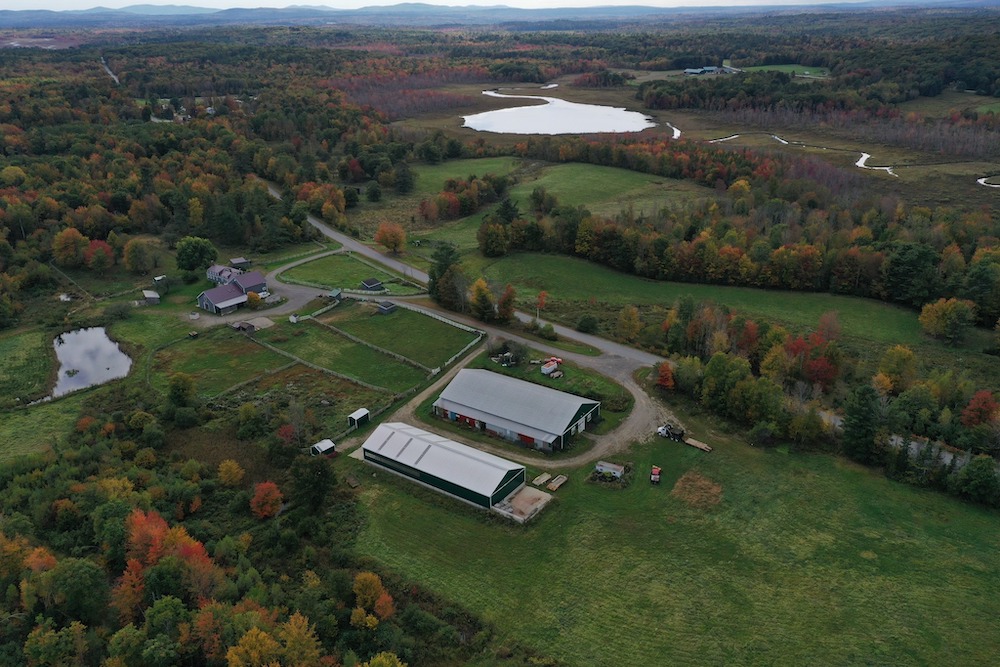
- Details
- By Chez Oxendine
- Food | Agriculture
A broad coalition of conservation groups, led by a Wabanaki-supporting food sovereignty organization, have backed an unconventional land transfer to give the latter complete control of 245 acres of farm and forest in Maine.
Niweskok, a nonprofit collective of Wabanaki farmers, health professionals, and educators working to revitalize food systems for tribes in northeast Maine, received the title for Goose River Farm earlier this month.
The property — which includes 37 acres of open fields, 163 acres of forest, and 30 acres of wetlands in Swanville, Maine — will transition from a horse and cattle farm into a hub for agroforestry, food education, processing, and other food sovereignty initiatives.
The organization has raised $1.9 million toward the purchase, with support from Maine Farmland Trust, Coastal Mountains Land Trust and numerous other partners. They need a final burst of fundraising through the end of January to complete the acquisition. The farm will help preserve the culture and traditions of the Wabanaki Confederation, which includes the Penobscot, Wolastoqiyik, Mi’kmaq, Passamaquoddy, and Abenaki of Odinak and Wolinak tribes. For the first time, Niweskok will have a permanent base for its programs after years of operating on borrowed and leased lands, according to co-director Alivia Moore.
“This project, for me, is about surviving genocide and the continuance of our values and lifeways as Wabanaki people,” Moore told Tribal Business News. “We’ve always understood the importance of feeding ourselves, and this is about restoring our access and relationship to our traditional foods.”
What sets this purchase apart is that the land transfer comes without conservation easements. These easements, which frequently accompany land returns or transfers, are often well-meaning. However, they can inhibit Indigenous stewardship by preventing practices such as prescribed burning, subdivision, or particular kinds of zoning for buildings or infrastructure.
A coalition of 12 organizations and several private donors helped secure the land for Niweskok without easements, giving the Wabanaki nonprofit sovereignty over the property, according to Heather Rogers, Land Protection Program director for Coastal Mountain Land Trust. Her organization has helped finance the Goose River purchase through fundraising and advocacy efforts.
“The land trusts had to approach it with humility - there are other ways to care for land that can end up with better outcomes, and I think we have all come to that realization,” Rogers said. “I think now that we've done it once, I think we would be open to doing it again that way.”
Maine Farmland Trust also supported the purchase, according to President and CEO Stacy Brenner, who sees the purchase as the beginning of a relationship between the trust and Niweskok.
“At Maine Farmland Trust, we protect farmland from non-agricultural development so that land can continue to sustain farmers and our communities for generations to come – and to succeed in that goal, we also need viable pathways for farmers and indigenous producers to get on the land,” Brenner said. “Under the stewardship of Niweskok, the productive soils, open fields, woodlands, wetlands, and all that the land offers will be protected and provide sustenance for generations to come.”
The absence of conservation easements leaves Niweskok free to pursue their goals as they see fit — a critical aspect of the organization’s mission, Moore said.
“We have been fighting, pushing, doing this project differently so there is no conservation easement on this land, so we can make the decisions we need to care for the land, and not be bound by an easement,” Moore said. “This isn’t the sort of conservation project people are used to funding, but it's actually been really incredible to hear folks say ‘I'm so glad to hear there is no easement, I'm so glad you're going to be able to enact Wabanaki values freely.’”
On the 245-acre property, Niweskok plans to develop land rehabilitation projects, improve biodiversity by reintroducing traditional plants and animals, and build new infrastructure, such as a butchery, greenhouses, and plant nurseries.
The site will also host community programs, from a school for teaching foodways, apprenticeships, an apothecary for medicinal collection and sales, and community workshops. Traditional foods and medicines planned for cultivation include green corn, black cohosh, and oak and maple trees.
Anthony Sutton, assistant professor of Native American Studies and Food Systems at the University of Maine Orono, said these programs will create crucial support for food sovereignty in the area. The new center will help restore trade and food assistance between Wabanaki tribes while rebuilding important cultural touchstones.
“Our strength comes from our ability to move foods through our communities,” Sutton said. ”[Through education and agriculture programs,] they're bringing back those community bonds.”
Unrestricted land use is vital to reaching these goals, Sutton added. He pointed to blind spots in many easements, such as a failure to recognize fisheries — central to some Wabanaki tribal subsistence and economic development — in traditional definitions of food sovereignty.
Traditional easements could limit Niweskok’s ability to include fish in their programs, for example.
“Those restrictions can be inconsistent with how Wabanaki look at food,” Sutton said. “With no restrictions, they can express what food means to them to the fullest potential.”
Editor's Note: This story's first paragraph has been updated to clarify Niweskok's lead role in the land transfer.
